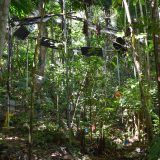November Research Highlights Quantum gravity, dairy processing, and evapotranspiration
November 9, 2023
New publications for faculty in the Schmid College of Science and Technology showcase the breadth and depth of research across the college’s physics, biology education research, environmental science and policy, and food science programs.
Jeremy Hsu, an assistant professor of biological sciences, has published new research on “Investigating the Influence of Assessment Question Framing on Undergraduate Biology Student Preference and Affect” with undergraduate student Noelle Clark and fellow biology professors Kate Hill and Melissa Rowland-Goldsmith. The research appears in the journal CBE–Life Sciences Education and was featured in a teaching newsletter from the Chronicle of Higher Education. Hsu’s study provides fundamental insights into how to write test questions for students to best comprehend the nature of the question and return answers that best reflect what they know.
Anna Colella, an alumna of the master’s program in food science, has published new research on how “Homogenization and thermal processing reduce the concentration of extracellular vesicles in bovine milk.” The research appears in the journal Food Science and Nutrition in collaboration with Anu Prakash and John Miklavcic, professors in the Food Science program. Their research describes efforts to ensure food processing methods for dairy products that preserve their full nutritional value. Colella now works as a research and development manager at See’s Candies.
Indrajit Sen, a postdoctoral research and teaching fellow in the Grand Challenges Initiative, has posted new physics research on “A realist interpretation of unitarity in quantum gravity” to the preprint server Arxiv in collaboration with Stephon Alexander (Brown University) and Associate Professor of Physics Justin Dressel. The study addresses key open questions in quantum gravity by applying an unorthodox approach drawn from the field of quantum foundations to study.
Joshua Fisher, an associate professor of environmental science and policy, co-authored a new report on “Remote sensing determining of evapotranspiration” on behalf of the Food and Agricultural Organization of the United Nations. The report is the most comprehensive synthesis to date of the use of satellite methods to quantify the amount of water evaporating from the Earth’s land surfaces. Such information is critically important for decision makers balancing the need for food security with increasingly severe and frequent droughts associated with global climate change. Fisher is pursuing ongoing research on predicting food shortages before they happen.


